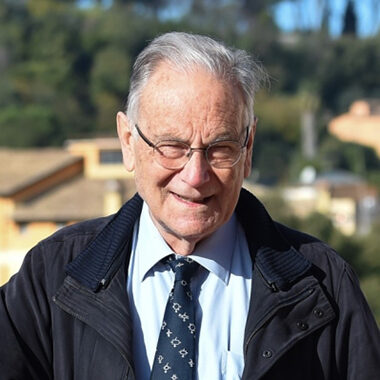Acceptance Speech – Rome, 18.11.2021 (Video + Text)
Spain
Joan Martínez Alier
2020 Balzan Prize for Environmental Challenges: Responses from the Social Sciences and the Humanities
For the exceptional quality of his contributions to the foundation of ecological economics, his pathbreaking analysis of the relationships between economies and the environment, his interdisciplinary as well as comparative approach, and his active role in the promotion of environmental justice.
To see the videos you must accept cookies
Mr President,
President and members of the Balzan Foundation,
Dear colleagues and friends,
In the last 120 years the human population grew five times while the yearly inputs processed in the global economy (biomass, fossil fuels, building materials, metals) grew from 7.5 to 95 Gt (Haas et al, 2020). The economy is not circular, it is increasingly entropic. Energy is not recycled and materials are recycled only to a small extent. Even a “degrowing” industrial economy would have to grab new supplies of energy and materials from the extraction frontiers, and would produce more waste (e.g. excessive amounts of greenhouse gases). Therefore, new environmental conflicts arise all the time. Since 2012 we have registered and described them in the Atlas of Environmental Justice (www.ejatlas.org). Environmental activists already mapped such conflicts around the world, also in Italy (http://cdca.it/atlante-italiano-dei-conflitti). The EJAtlas is a collective endeavor helped by European grants – with Susan Trumbore and Jean-Marie Tarascon, we are all three recipients of ERC Advanced Grants but not all re- cipients of ERC grants get Balzan prizes. I am therefore very grateful to you.
The Balzan Prize has been given to famous economic-social historians: Ernest Labrousse, Carlo Ginzburg, Carlo Cipolla, Eric Hobsbawm, and to younger colleagues, Manuel Castells, Bina Agarwal. I am particularly honored to be in their comfortable company. After I studied economics in Barcelona, and agricultural economics, I was educated as a research fellow at St Antony’s College of the University of Oxford for a decade, a stronghold of contemporary history. I wrote books on agrarian conflicts in Andalusia, Cuba, and highland Peru. Coming back to Barcelona in 1975, my chair was in Economic History and Institutions. In the early 1970s, influenced by economic anthropology (Roy Rappaport’s Pigs for the Ancestors on Papua New Guinea), I realized that agriculture was a system of transformation of energy, and with J.M. Naredo we authored articles on the history of agricultural energetics (explaining what Engels and Vernadsky thought of Podolinsky’s accounts of 1880). We looked at the economy as metabolic flows of energy and materials. Influenced by Georgescu-Roegen’s (1971) The Entropy Law and the Economic Process I wrote a book of economic-ecological history Ecological Economics: Energy, Environment and Society (1987; Garzanti, Milano, published the Italian version). With Herman Daly, Bob Costanza, Ann-Mari Jansson and others we started the International Society for Ecological Economics in 1990. We came from two sources: human ecologists interested in energetics, e.g. H. T. Odum had said in 1971 that modern farming was “farming with petroleum”; and dissident economists: Georgescu-Roegen, Kenneth Boulding, K. W. Kapp. And before them, one hundred years ago, Frederic Soddy, Patrick Geddes, and Otto Neurath, the analytical philosopher from Vienna who in the 1920s-30s in the “socialist calculation debate” emphasized incommensurability of values.
Ecological economics and industrial ecology share the socio-metabolic view of the economy. This was practiced in Italy by Giorgio Nebbia (1926-2019), a professor of merceologia. In German this science of commodities was called Warenkunde. I list some of those exported from the “commodity extraction frontiers” (Moore, 2000) in an ecologically unequal trade: iron ore, bauxite, soybeans, palm oil, copper, oil, gas, coal, gold, silver, platinum, the new metals for solar electricity (lithium, cobalt), nickel, ilmenite, rutile, zircon, the cotton and sugar of colonial America, the guano of Peru in 1840-80, the silver from Potosi and Zacatecas or the pepper brought by Vasco de Gama from Malabar. Kolonialwaren, if you like. They came and come in large quantities, produced by current or “bottled” photosynthesis and the carbon cycle, or from other biochemical cycles and geological-chemical processes. They were and are extracted (but not produced) by human work (slaved, forced or “free”).
The focus on energy and material flows, and my background on agrarian conflicts (as a regular author in the Journal of Peasant Studies since the 1970s), led me to study environmental conflicts in Latin America and in India. I published Varieties of Environmentalism with Ramachandra Guha in 1997, and in 2002 The Environmentalism of the Poor: A Study of Ecological Conflicts and Valuation linking ecological economics with political ecology (the Italian version, Jaca Books, Milano, was edited by historian Marco Armiero). All this drew on the friendship after 1994 with Acción Ecológica and Oilwatch in Ecuador and Nigeria, with their slogan “leave oil in the soil” to prevent local damages and also climate change. Behaving as extractive industries do, Texaco-Chevron and Shell left behind socio-environmental liabilities in both countries. This we call “corporate social irresponsibility”.
Environmental conflicts display ecological values, livelihood values, economic values, sacredness, indigenous territorial rights. These plural values are not commensurate, they cannot be reduced to one another. Ecological economists use multi-criteria evaluation but even then: who has the power to exclude some criteria, to choose the participant stakeholders, to choose the time horizons. In a nutshell, who has the power to simplify complexity and (try to) escape un- certainty? Political science studies power. This is why political ecology studying such “ecological distribution conflicts” is political ecology. The Atlas of Environmental Justice is then a tool for comparative, statistical political ecology (Scheidel et al, 2020). In this line, I hope to finish another book: Land, Water, Air and Freedom – World Movements for Environmental Justice that will remember many environmental victims but also register many successes contributing to environmental sustainability. The Balzan Prize will be “recycled” to this purpose.
